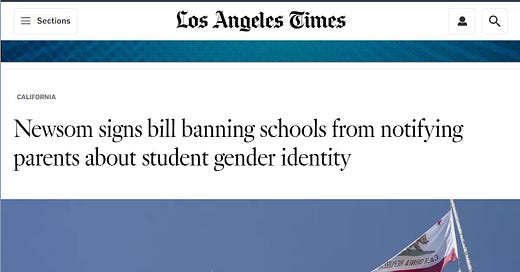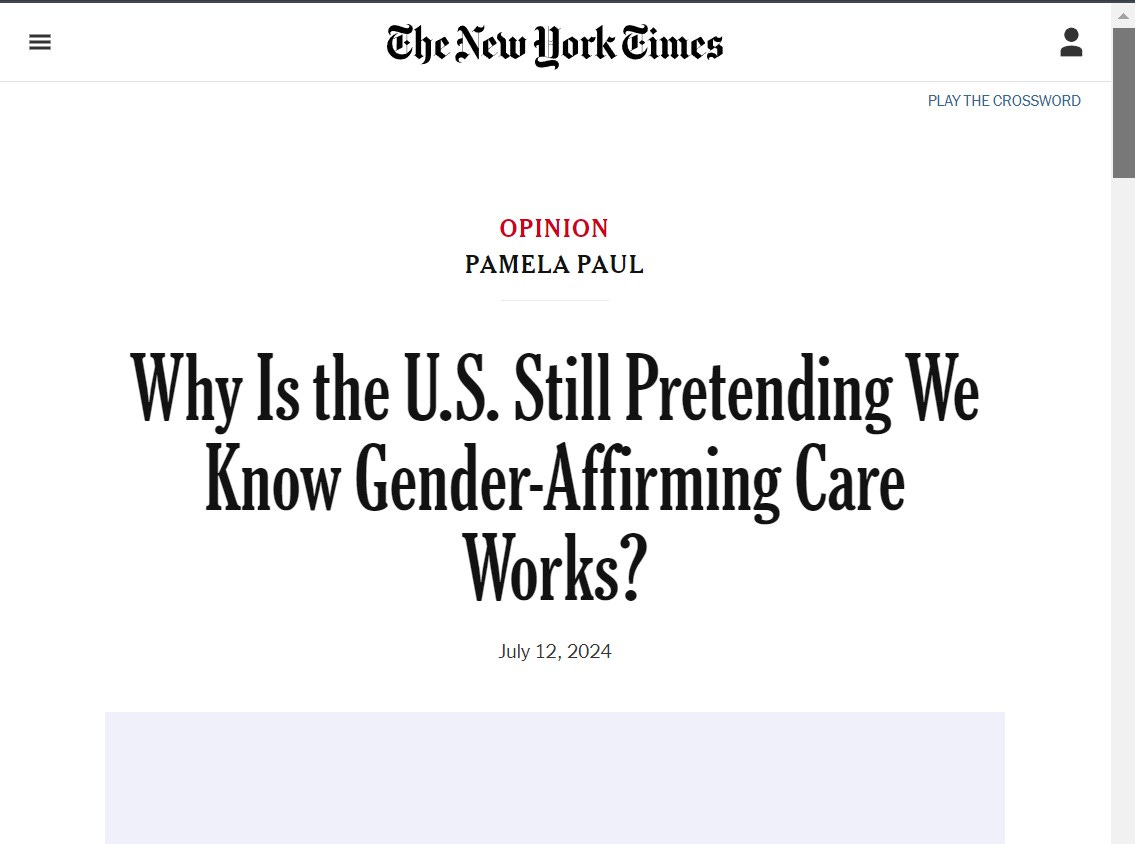California Governor Signs Law Keeping Parents in Dark about Student Gender
Here's why his law will fail
On Monday, California Governor Gavin Newsom signed AB 1955, a new state law heralded as a “bill banning schools from notifying parents about student gender identity.”
The law is being widely misrepresented, but the problem is the intent: the state of California believes that all parents are inherently dangerous to their children, and doesn’t want schools to tell parents if their child suddenly decides they were born in “the wrong body.”
That should scare every parent to the core.
California State Senator Scott Wiener, co-author of AB 1955 famously said, “These are our kids.”
Parents who dare fight him on this are “Nasty people.”
Clearly, political discourse in America is broken.
Why is the state so interested in separating parents from their children?
AB 1955 draws a line in the sand about the primary purpose of government. On one side, the family unit - the fundamental building block of society which existed long before any government. On the other, California, an ever expanding bureaucracy which always “knows better” than parents and is on a mission to begin educating - sorry, indoctrinating - your child as early in life as possible as part of its $3B “Whole Child Education” plan.
Governor Newsom, Senator Wiener, California Attorney General Rob Bonta and other officials have been working for years to use any crisis “as an opportunity to reshape the way we do business and how we govern.”
Newsom unceremoniously admitted to this at the beginning of the COVID-19 pandemic, and after years of mandates and executive orders, we know exactly what he meant — an opportunity to massively expand the powers of the state.
And he would have gotten away with it, if not for some pesky parents, churches and community members who decided to stand up for their rights and file numerous lawsuits to put an end to these unconstitutional mandates (I was one of them).
The state of California remains undeterred.
The family is the last remaining threat to the unchecked power of the state - especially when many families are becoming increasingly skeptical of the overreaching actions of our government. By convincing children that their parents are hostile and dangerous to their mere existence, California is attempting to drive a massive stake through the heart of the family unit.
The Myth of “Forced Outings”
The primary talking point for proponents of AB 1955 is that it prohibits “forced outings” of an LGBTQ child to their parents. This is a myth that rests on three false assumptions:
Children have a right to privacy with respect to their parents (they don’t).
A student who decides to publicly identify by a different name and use a different bathroom at a public school - with their classmates, teachers, principals and other parent volunteers - has an expectation of privacy (they don’t).
These - now banned - parental notification policies previously applied to sexual orientation and required a teacher to notify parents if a child is gay (they never did).
Since there has never been such a thing as “forced outing,” the rhetoric falls apart, and the issue turns to the real problem: Do parents have a right to know if their child is experiencing a mental health issue?
That’s not a difficult question to answer, as parents are already required to be notified for all kinds of minor issues with their child at school, from missing class to getting into a fight to needing an aspirin for a headache.
The Myth of Gender “Identity”
The key to the entire conversation around gender is to understand that we’re talking about a mental health issue: A child who decides to change their name or gender believes they are born in the wrong body and is likely experiencing gender dysphoria, which the American Psychiatric Association defines as “psychological distress that results from an incongruence between one’s sex assigned at birth and one’s gender identity.”
For a comprehensive look at all of the issues around gender, youth and schools, check out our Restore Childhood Gender Toolkit.
There is widespread agreement that gender dysphoria is associated with extremely high percentages of depression and suicidality - there is disagreement on why and how to treat it.
California Mandates That Teachers Inform Parents
So the question remains, is a child’s request to change their “gender identity” something a teacher should withhold from a child’s parents? No.
Here’s where we have agreement from both sides. The author of AB 1955, California Assemblymember Chris Ward, stated during a hearing on the bill that a teacher can still report a student’s request to change their gender identity to the parents “if a teacher as a mandated reporter does feel that there is reason for concern, if there is an exhibition of declining performance in school, clear attribution of mental health struggles” or “risk of harm.”
We agree! Teachers should report a student’s request to change their gender identity!
In fact, as “mandated reporters,” they are required to report this request, right? Not so fast.
California Also Mandates That Teachers Keep Secrets From Parents
The fundamental disagreement is that Ward, most LGBTQ groups and the American medical organizations believe that changing one’s gender can also simply be an “identity” you assume, like coming out as gay, and that this does not implicate any issues of mental health. Worse, since they conflate gender “identity” with sexual orientation, they are adamant that everyone must affirm a child’s decision to change their gender, just as they would affirm a child who comes out as gay. The problem with this social-justice inspired affirmative care model is rampant.
This is the conversation LGBTQ groups and their political allies refuse to have - is believing you were born in the wrong body an “identity” we should affirm or a mental health issue we should treat?
At the moment these groups are only willing to concede that it could be a mental health issue, so teachers must keep a child’s change in gender identity a secret unless there is “reason for concern.”
But isn’t a child deciding to change their gender a clear sign of gender dysphoria and a “reason for concern?” That child, in the formative years of their life, has made a monumental decision- they hate who they are - including a “strong dislike of their biological sex.”
This is certainly a serious “reason for concern” for a parent or guardian.
How We Win: Fighting Statist Notions
The renewed battle against the family and our fundamental parental rights is only just beginning, but there is reason to be hopeful. AB 1955 was drafted as a retaliatory measure after the State of California and its allies lost numerous legal battles on parental notification policies in California courts, from Chino Valley to Temecula to Escondido.
While Senator Brad Hoylman just announced he will introduce similar legislation to AB 1955 in New York, Liberty Justice Center has already filed a lawsuit to stop AB 1955 from being implemented in California.
As these legal challenges wind their way through the courts, they will eventually run head on into the Supreme Court, which has over one hundred years of legal precedent affirming parental rights. On the specific topic of AB 1955 - whether the government should assume that all parents inherently pose a danger to their children - the Supreme Court was very clear:
“The statist notion that governmental power should supersede parental authority in all cases because some parents abuse and neglect children is repugnant to American tradition.” Parham v. J.R., 442 U.S. 584 (1979), at 603.
The federal judge that struck down the Escondido school district’s policy requiring teachers to keep secrets from parents was even more clear about parents needing to be involved if a child is dealing with gender dysphoria:
"A parent's right to make decisions concerning the care, custody, control, and medical care of their children is one of the oldest of the fundamental liberty interests that Americans enjoy. However, if a school student expresses words or actions during class that may be the first visible sign that the child is dealing with gender incongruity or possibly gender dysphoria, conditions that may (or may not) progress into significant, adverse, life-long social-emotional health consequences, would it be lawful for the school to require teachers to hide the event from the parents?" - Mirabelli v. Olson, 3:23-cv-00768, (S.D. Cal.), Order Granting Motion for Preliminary Injunction, Sept. 14, 2023.
Until then, the best way to fight against statist notions like AB 1955 is to stop electing statists.
In case you hadn’t heard, there’s an election in November. Get Out and Vote!
Download Restore Childhood’s Gender Toolkit HERE.










Thank your for this thorough analysis, Scott!
I feel it's unfortunate that the judge, in his decision, lumps "gender incongruence" right in with "gender dysphoria". He is clearly talking in the rest of the quote about a concern for mental illness. But gender incongruence without gender dysphoria is NOT a mental illness. And, in fact, it is statistically a pretty good indicator of likely same-sex attraction (which means the unnecessary addition of it in the order actually does bring up concerns over "outing" gay students when, as you noted, that's not in the bill). Since gender incongruence isn't a mental illness, there is not even a list of symptoms or attributes defining it. What is a gendered thing to some-black nail polish or eye liner on a boy or a shaved head for non-medical reasons on a girl-is simply self-expression, teen rebellion, or perhaps an affiliation with goth or punk subculture to others.
Those issues aside, gender incongruence is a normal variation in personality and style. Lumping it in with "signs of mental illness" seems to actually be feeding into the gender ideology idea that if you're a tomboy or a feminine male, then there is something wrong with you and you can't be your biological sex. It's really too bad that the judge in charge of this case sees this as the same as gender dysphoria, which is a mental illness and is associated with serious risks, including self harm.
On a separate note, the emphasis on informing parents about mental illness interests me for another reason: while it's of course true that one's observable actions and words in public are not covered by a right to privacy (whether one is a minor or an adult), minors over age 12 actually DO have a right to privacy in matters of sexual and mental health in many states. I'd be shocked if CA wasn't one, though please feel free to tell me if you know differently. But, that opens quite the can of worms as the two concepts: that there is no right for a teen over the age of mental health consent to request confidentiality from teachers because teachers should tell parents about signs of possible mental illness, but there IS a long-established right to confidentiality about the exact same issue from health care providers because in those states teens do in fact have confidentiality in mental and sexual health matters. Seems quite contradictory.
I'm curious to see if that becomes an issue as this works it's way through the courts. Thinking as a provider, it would be quite the conundrum for a parent to bring a teen, over the age of consent for mental health, in for care because a teacher expressed concerns, and then for me to be legally barred from talking about those concerns with the parent because the state has determined that teens of a certain age should be allowed to manage their own mental health matters and choose who knows about them. I imagine the parent would be understandably frustrated if one professional tells them their child is mentally ill and then the mental health provider says "sorry, but i can't give you my opinion or tell you my treatment plan".